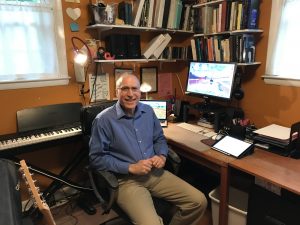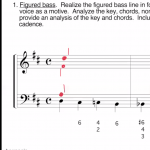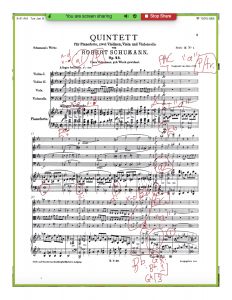Faculty Spotlights - Kip Wile

“[While remote teaching], we were able to retain many of the elements of previous courses, such as in-class discussion, regular feedback on in-class work and assignments, and longer-term feedback on larger assignments or exams.”
 Kip Wile, Professor, Music Theory
Kip Wile, Professor, Music Theory
What are some of your main goals as an instructor related to student learning?
In general, to create a clear and strong technical understanding of music, which can be used to help students strive for greater sophistication in their interpretations of musical style and strategy.
How did your teaching progress after you started teaching remotely?
Actually pretty well. We were able to retain many of the elements of previous courses, such as in-class discussion, regular feedback on in-class work and assignments, and longer-term feedback on larger assignments or exams.
 What is a challenge you’ve encountered while teaching, and how did you address it?
What is a challenge you’ve encountered while teaching, and how did you address it?
One challenge was to give exams. We held them in real time, with students leaving their cameras on in a Zoom classroom and downloading/uploading their exams to the Learning Management System (with additional time permitted). I scheduled an evening time (using a different version of the exam) for students in alternate time zones, and also included, as usual, extra time for disability accommodations. I felt that this mostly took care of security concerns. While technically it would have been possible for students to communicate during an exam, exams were carefully monitored and checked, and this would have been of limited use since they were often based on individual responses (as opposed to right and wrong answers).

Kip Wile sharing his iPad screen to Zoom
What does your teaching setup at home look like?
I use three devices: 1) a laptop, which I use as my main “controller” (communicating with students, playing recordings, and linking to other devices); 2) a desktop with a large monitor, used to sign into Zoom as a student as well, allowing me to see what the class looks like to them; and 3) a 10″ iPad Pro with a pen that was supplied by IT@Peabody; I share this to the screen for marking assignments and scores during classes and tutoring. I also have a Yamaha electric piano, which I play through speakers directly into the mic on my laptop. Since the piano is more to demonstrate excerpts than to perform entire movements, I found this adequate.
What advice do you have for other faculty?
My main advice might seem obvious – that teaching remains the primary goal. (For example, I use the combination of older and newer methods that I feel best facilitates my way of teaching.)
How do you want your students to remember this time after they have left Peabody?
That despite the absence of in-person teaching, they were able to gain a rich and rewarding educational experience that was highly beneficial to their growth as musicians.
View Kip Wile’s faculty page and bio.